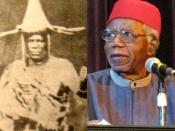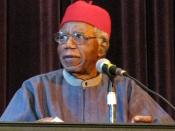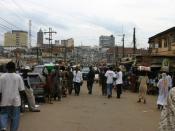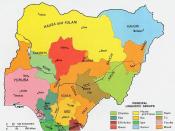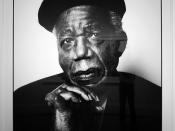"When the missionaries came to Africa they had the Bible and we had the land. They said, "Let us pray." We closed our eyes. When we opened them we had the Bible and they had the land." said Bishop Desmond Tutu. Chinua Achebe illuminates two painful features of African life, the first one is the abasement practiced on the IBO people by their own traditions and customs, and the second one is the control of land and natural resources by European missionaries in the form of direct colonization of Nigeria. Things Fall Apart focuses on the transition when it is being deep-rooted, for instance traditional values are put in conflict with a strange but powerful culture that will split them apart because of the arrival of the missionaries and their determination to idealize another culture. The villagers, in general , are disconcerted between resistance and acceptance of change, in addition, they face the problem of trying to determine the way to adapt to the current situation.
Many of the villagers are keyed up about the new opportunities and techniques that the missionaries are going to bring. This foreign influence, however, threatens to quench the need for the mastery of traditional methods in farming, production and all aspects of living. These traditional methods, once crucial for survival, are now, to varying degrees, not essential. That is, colonialism was the turning point that forced things to fall apart.
Furthermore, Achebe portrays the idea of colonialism, and the way it quietly gains acceptance across the country and then takes over just when the country has been disrupted enough to be overruled by foreign forces. When religion is acting as the foothold, it makes it easier for a foreign government to take over because most religions support peace and control an essential part of people's lives. Achebe clearly emphasized that when Obierika said "How do you think we can fight when our own brothers have turned against us? The white man is very clever. He came quietly and peaceably with his religion. We were amused at his foolishness and allowed him to stay. Now he has won our brothers, and our clan can no longer act like one. He has put a knife on the things that held us together and we have fallen apart"(176).
Moreover, Achebe highlights the intelligent techniques that colonialism uses to weaken the country and tear it into opposing sides. In fact, the missionaries brought trade into Umuofia, therefore the village was not solid against them since they had provided new means for the villagers to profit. With this opportunity, they were willing to accept the confines of the white man's rule because they weren't willing to forgo the new trade activity to fight for their hidebound customs and traditions. To illustrate that, Achebe said "The white man had indeed brought a lunatic religion, but he had also built a trading store and for the first time palm-oil and kernel became things of great price, and much money flowed into Umuofia"(178).
In addition, Achebe portrayed the impact of colonialism on umofians'identity, it converted them into Christians, moreover, it abandoned their commitment to their religion, traditions, customs and heritage. However, it seems like Obierika represents Achebe's own beliefs. Upset by the fact that the white men have come and completely ignored the Ibo's values, Obierika illustrates how it is impossible for the colonialists to understand anything about the Umuofians'heritage and customs without even speaking their "tongue"(176). In addition, he believes that the Umuofians who have converted to Christianity have wrongly turned their backs on their own "brothers"(176). Nonetheless, if religion and tradition are the bonds that held the clan together, and when both of them became defective, it becomes hard to decide who holds the responsibility for the resulting destruction.
To conclude, colonialism was the turning point that forced things to fall apart. However, the novel serves to play the role of a reminder to the Nigerians of their heritage and of what once was, it serves to deliver an accurate picture of how a society deals with change, the effect of change on individuals, and the consequences of resistance, against root changes ,that affect such a closed society. "If only the falcon could have heard the falconer, maybe things would not have fallen apart" -W. B. Yeats, The Second Coming.
Bibliography:1. Achebe,Chinua: Things Fall Apart
